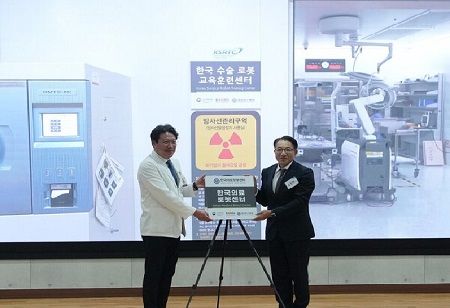YUHS hosted an opening ceremony for the KMRC at the Avison Biomedical Research Center (ABMRC) in Seoul.
Yonsei University Health System (YUHS) said it would strengthen the global competitiveness of the Korean medical robotics industry with the expansion of the Korea Medical Robot Center (KMRC).
YUHS was recently named the second-phase Domestic Medical Device Education and Training Support Center by the Korea Health Industry Development Institute (KHIDI) under the Ministry of Health and Welfare.
The KHIDI project aims to expand physicians’ experience in using Korean medical devices by establishing a medical device education and training infrastructure, verifying and improving the performance of domestic products, and promoting their use. The project has a total budget of 6 billion won ($41.3 million) for five years starting this year.
In 2020, YUHS became the first institution in Korea to operate the Korea Surgical Robot Training Center (KSRTC) after being designated by the government as the first-phase Domestic Medical Device Education and Training Support Center. Since then, it has worked to develop domestic surgical robots, train doctors, and expand the supply of domestic medical devices for the past five years.
The training program, which began with two surgical robots from two Korean robotics companies, has expanded to a total of eight fields, including spine, brain, artificial joints, and cardiovascular applications. The program has also facilitated more than 200 user evaluations of medical devices, including product assessments and hands-on experience.
Among the four local medical device education and training support centers in Korea, YUHS is the only one with a one-stop facility for non-clinical training using mock-up models, animals, and cadavers, as well as observation.
Based on these strengths, during the first phase of the project, YUHS trained about 800 domestic and foreign doctors and distributed more than 130 domestic medical robots to overseas markets, including the U.S., Germany, and Indonesia.
With the launch of the second phase, YUHS will expand the scope of support by upgrading KSRTC into KMRC. It plans to develop a more comprehensive support system by expanding training beyond surgical robots to include artificial intelligence-based medical devices and rehabilitation medical robots.
YUHS is focused on improving physicians' expertise and boosting the global competitiveness of the domestic medical robotics industry. This will be achieved through advanced training in medical robotics, collaboration with companies to operate overseas business centers, and skill development in partnership with medical associations.
Yi Seong, head of KMRC and a professor in the Neurosurgery Department at Severance Hospital, committed to offering comprehensive support for domestic medical robots and developing human resources through medical education and training.
Oh Chang-hyun, director general of the Health Industry Promotion Division at KHIDI, said, “The re-designation of YUHS as a support center for domestic medical device education and training is expected to further revitalize professional training in the field of medical robots”.
He added that the health ministry will persist in supporting the expansion of domestic medical device use in clinical settings and enhancing global competitiveness.

